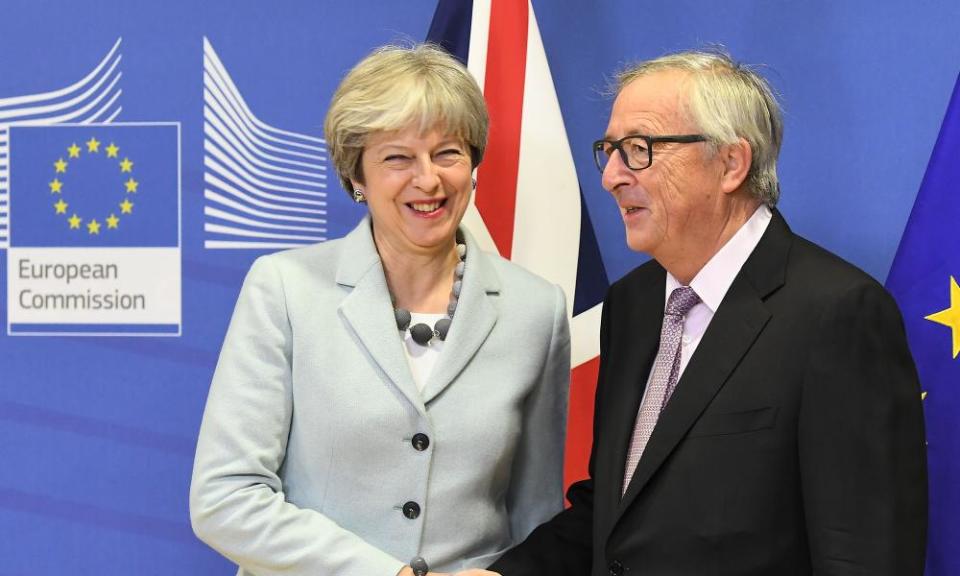Low skills, low pay: that’s really why Brexit campaigners want to be out

A hard Brexit is still on the cards despite the cheers of business leaders for Theresa May’s fudged deal on the Irish border, concessions on EU citizens’ rights and the rise in the exit fee from £20bn to nearer £50bn.
It’s easy to see how phrases like “regulatory alignment”, when coupled with a two-year transition period, could be welcomed by corporations as offering the prospect of a soft Brexit. Another reason would be the flailing of Nigel Farage and his fellow Brexiter Gisela Stuart as they accuse May of signing just about as bad a deal as they could imagine.
Farage was withering when he said any attempt at regulatory alignment undermined the referendum vote, which was a vote to free the UK in every way from the EU’s yoke. Stuart, the former Labour MP who joined Farage on the Brexit battlebus, gave a more detailed critique in a blogpost on the ConservativeHome website, where she warned that the UK would end up in the same position as Ukraine.
“In industries covered in the EU-Ukraine agreement, Ukraine must align itself with EU law and cannot introduce new legislation unless it meets the standards set by Brussels,” she said. “Make no mistake. This is single market membership in all but name. And to make matters worse, Ukraine has no representatives in the EU who can help shape this legislation for the benefit of its own businesses or economy.”
It’s not that Stuart is faking her pain, or that she and Farage think the deal is anything but a disastrous capitulation. She is genuine in applying the logic of May’s deal to a real endgame where the UK avoids free movement of labour, unlike Norway and Switzerland, but must re-enact every commercial law laid down in Brussels.
It’s just that Farage and Stuart cannot be as angry as they might seem, because they know the wording of the deal has more holes than a fishing net and can ultimately be interpreted to mean whatever they want.
So while they haven’t won, they haven’t lost either. And once the Brexit vote is passed, most likely next autumn, the government of the day will find it can interpret “regulatory alignment” any way it likes. Then, if Stuart turns out to be right that Brussels will insist on absolute attachment to EU rules as part of a trade deal, there will be the option to just walk away and revert to World Trade Organisation rules.
Far from frightening many in the Leave camp, the move to WTO rules holds little for them to be fearful about. On the “Leave left”, it allows for a re-run of Soviet-style socialism-in-one-country that brings with it widespread nationalisations and state control in many, if not all, aspects of life.
On the right it is favoured by free-market Brexiters like the economist Patrick Minford, who see the EU as a barrier to efforts at driving down the cost of living through access to cheap food (such as US chicken and beef), cheap energy and striking out almost every rule that protects workers’ rights.
In the centre ground of Brexit, which is occupied by the likes of Michael Gove, accepting WTO rules and the regulatory freedom that comes with them offers a chance to drive up standards and compete on a higher plane than even European nations do.
These competing visions have many points of agreement – for example, Labour’s attitude to standards, which are not far away from Gove’s. But what Labour and Gove do not see is that the objections to Britain’s entry into the European Economic Community in 1973 still form the backbone of Brexit objections to the EU today.
When Ted Heath signed up to the EEC, Britain was out of step with France, Germany, Holland and even Italy. The UK was a low-cost, low-wage economy when its neighbours operated behind high tariffs to protect high-cost, high-wage economies.
Very quickly, and mainly as a result of the oil price rises in the 1970s, the UK became a high-cost, low-wage economy. Margaret Thatcher stepped in to bridge the gap – not, as is commonly believed, with a productivity revolution, but with a mass sell-off of public utilities that allowed her to cut taxes. The deregulation of financial and labour markets kept costs low for employers even as wages rose. Tony Blair kept it going with further deregulation of markets to promote private borrowing. Since 2008, the trick has proved hard to repeat.
It is clear that the dominant strand of Brexit campaigners understand that a return to an economic model last seen in the 1970s is not just an exercise in nostalgia – it plays to the strengths of a service economy based on low skills and low pay.
May’s deal, on second glance, looks more like a mirage. Brexiters know that a full-blown trade deal comes with free movement attached, which is unacceptable under the terms of last year’s referendum. Regulatory alignment looks like a mirror image of the Ukraine pact, which is the worst of all worlds. As such, both prospects actually elevate a hard Brexit to the top of the agenda.

 Yahoo Finance
Yahoo Finance